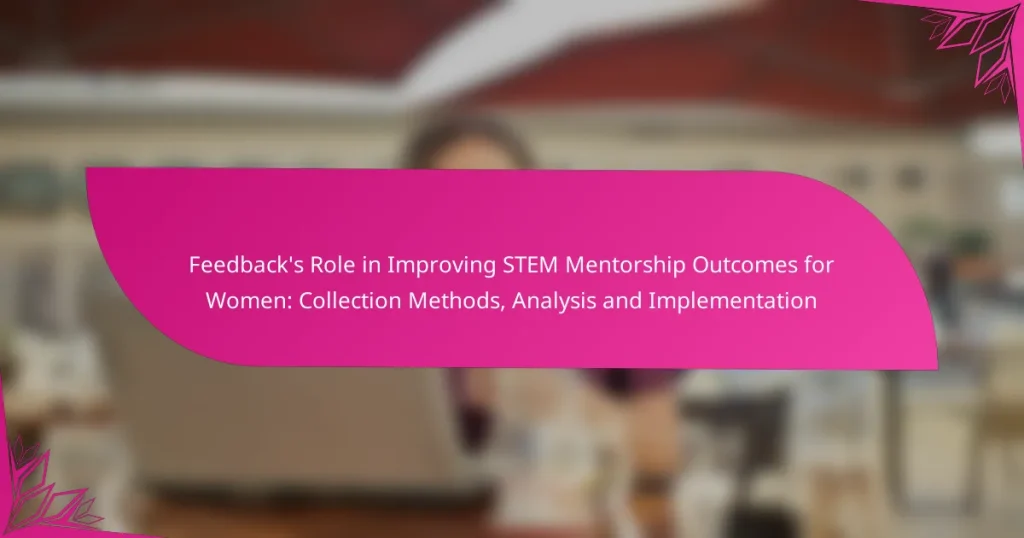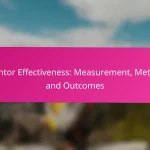Feedback plays a crucial role in improving STEM mentorship outcomes for women by promoting open communication and enabling personalized support strategies. By employing various collection methods, such as surveys and interviews, mentors can gain valuable insights into the unique challenges faced by their mentees. Analyzing this feedback allows organizations to identify trends and refine their mentorship approaches, ultimately enhancing the effectiveness of support provided to women in STEM fields.
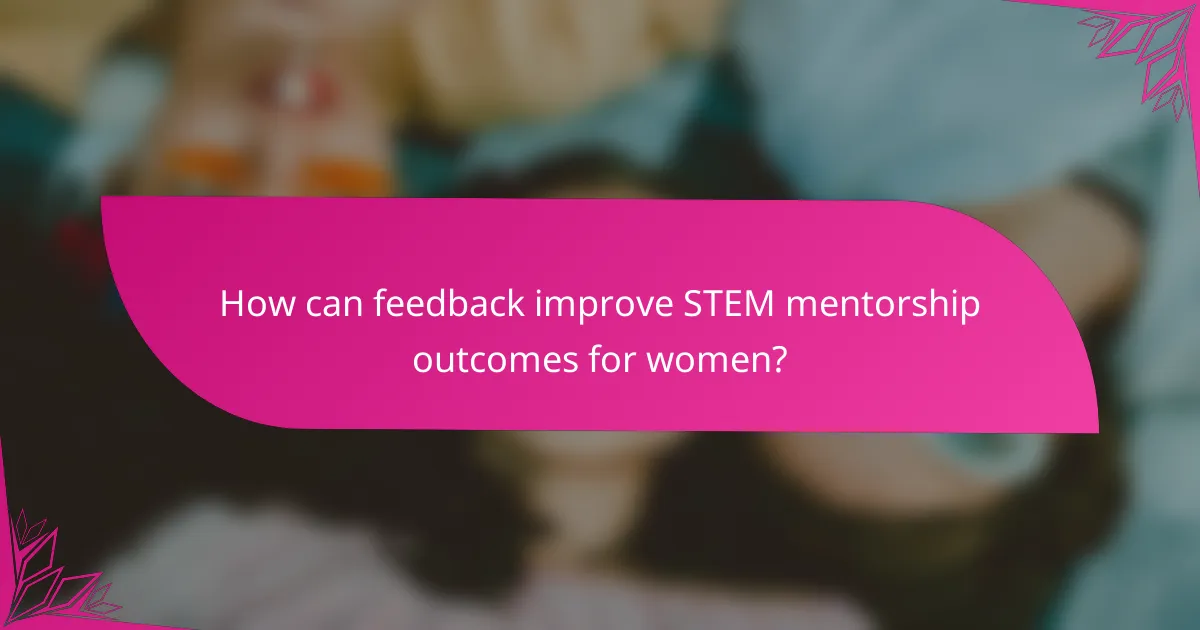
How can feedback improve STEM mentorship outcomes for women?
Feedback is essential in enhancing STEM mentorship outcomes for women by fostering open communication, increasing engagement, and allowing for personalized mentorship strategies. By systematically collecting and analyzing feedback, mentors can better understand the needs and challenges faced by their mentees, leading to more effective support and guidance.
Enhanced communication strategies
Effective communication is crucial in mentorship, and feedback helps identify areas for improvement. Regular check-ins and surveys can facilitate open dialogue, allowing mentees to express their thoughts and concerns. This two-way communication strengthens the mentor-mentee relationship and ensures that both parties are aligned in their goals.
Consider implementing structured feedback sessions where mentees can share their experiences and suggestions. This could be done through anonymous surveys or one-on-one discussions, enabling mentors to adapt their communication styles to better suit the needs of their mentees.
Increased participant engagement
Feedback mechanisms can significantly boost engagement levels among women in STEM mentorship programs. When mentees feel their opinions are valued, they are more likely to participate actively in the mentorship process. Engaging activities, such as workshops or collaborative projects, can be designed based on feedback to ensure they resonate with participants.
To maintain high engagement, consider using gamification techniques or incentives for providing feedback. This could include recognition for active participants or small rewards, which can motivate mentees to contribute their thoughts and experiences.
Tailored mentorship approaches
Feedback allows mentors to customize their approaches to meet the unique needs of each mentee. By analyzing feedback, mentors can identify specific challenges faced by women in STEM and adjust their strategies accordingly. This tailored approach can lead to more effective mentorship outcomes and greater satisfaction for both mentors and mentees.
For instance, if feedback indicates that a mentee struggles with networking, the mentor can provide targeted resources or arrange networking opportunities. Regularly revisiting and adapting mentorship strategies based on feedback ensures that the support remains relevant and impactful.
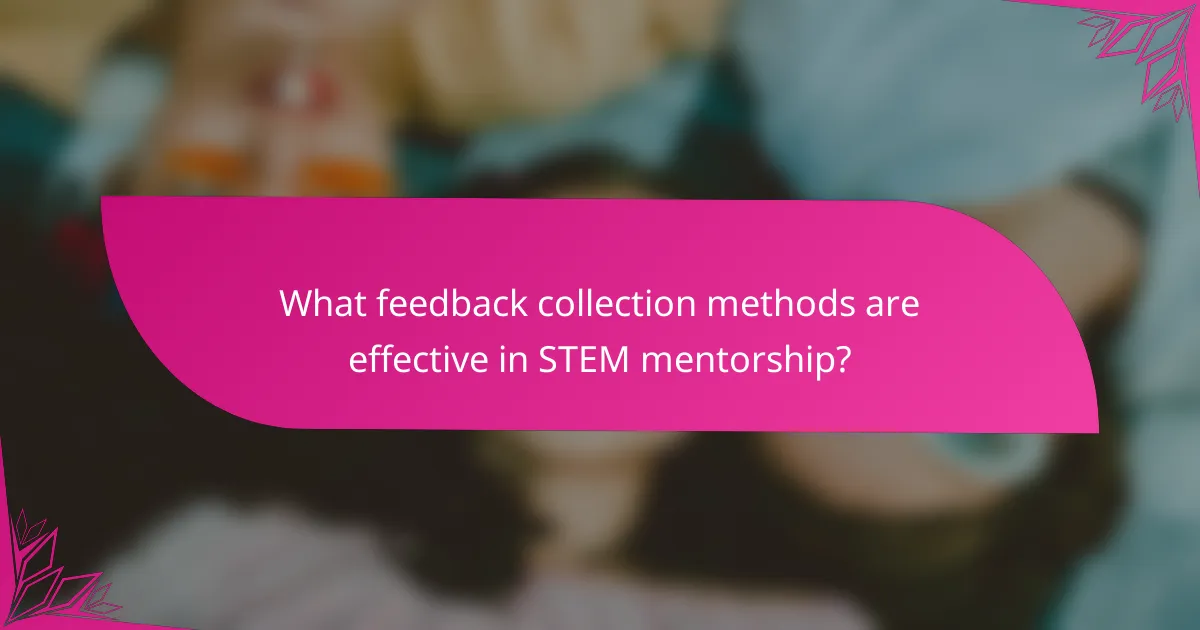
What feedback collection methods are effective in STEM mentorship?
Effective feedback collection methods in STEM mentorship include surveys, focus groups, and one-on-one interviews. Each method has unique advantages and can be tailored to gather specific insights from mentees, especially women in STEM fields.
Surveys and questionnaires
Surveys and questionnaires are efficient tools for collecting quantitative feedback from a larger group of mentees. They can include multiple-choice questions, Likert scales, and open-ended responses to gauge satisfaction and identify areas for improvement.
When designing surveys, ensure questions are clear and concise to avoid confusion. Aim for a completion time of 5-10 minutes to encourage higher response rates. Utilizing online platforms like Google Forms or SurveyMonkey can streamline distribution and analysis.
Focus groups
Focus groups facilitate in-depth discussions among a small group of mentees, allowing for richer qualitative insights. These sessions can uncover underlying issues and generate ideas for enhancing mentorship experiences.
To conduct effective focus groups, select participants who represent diverse perspectives and create a comfortable environment for open dialogue. Sessions should last about 60-90 minutes and be guided by a skilled moderator to keep discussions on track.
One-on-one interviews
One-on-one interviews provide personalized feedback and allow for deeper exploration of individual experiences. This method is particularly valuable for understanding specific challenges faced by women in STEM mentorship.
Interviews should be structured yet flexible, allowing for follow-up questions based on responses. Aim for a duration of 30-60 minutes, and consider recording sessions (with consent) for accurate data capture. Prepare a set of core questions while remaining open to spontaneous discussion points.
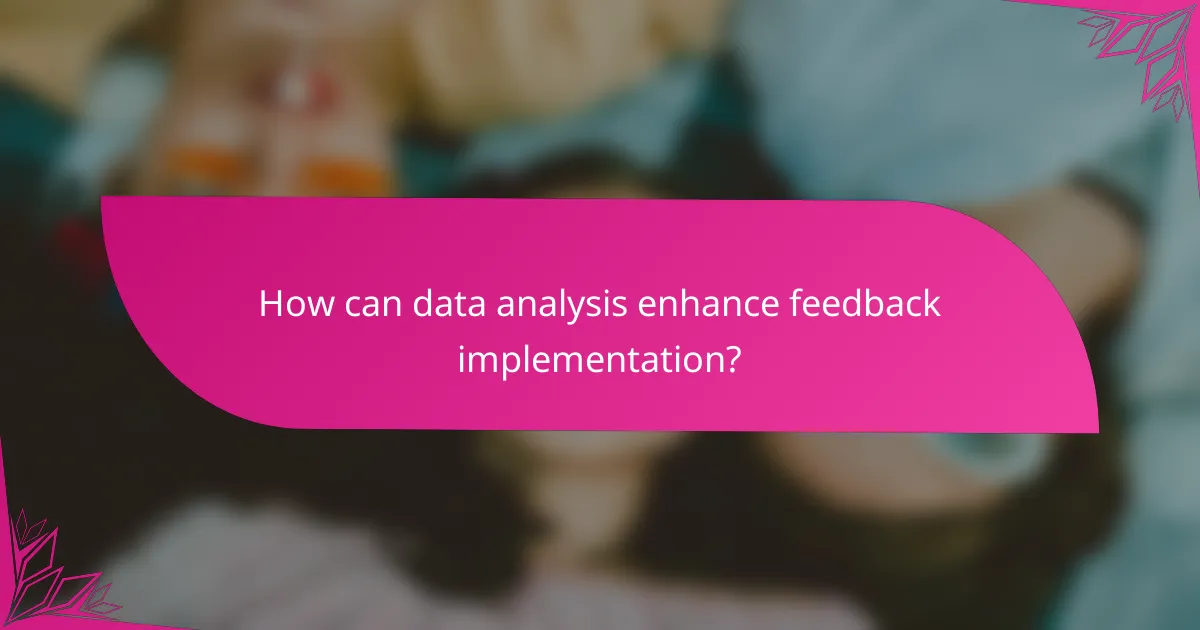
How can data analysis enhance feedback implementation?
Data analysis can significantly improve feedback implementation by identifying trends, strengths, and weaknesses in mentorship programs. By systematically analyzing feedback, organizations can tailor their approaches to better support women in STEM, leading to more effective mentorship outcomes.
Qualitative analysis techniques
Qualitative analysis techniques involve examining non-numerical data, such as open-ended survey responses and interview transcripts. Methods like thematic analysis can help identify recurring themes and sentiments that reveal participants’ experiences and perceptions. For instance, coding feedback into categories can highlight common challenges faced by women in STEM mentorship.
Consider using tools like NVivo or Atlas.ti for organizing and analyzing qualitative data efficiently. These tools can streamline the process of identifying key insights, making it easier to implement changes based on participant feedback.
Quantitative data interpretation
Quantitative data interpretation focuses on numerical feedback, such as ratings from surveys or performance metrics. Analyzing this data can provide measurable insights into the effectiveness of mentorship programs. For example, tracking the percentage of women who report increased confidence or skill acquisition after mentorship can guide program adjustments.
Utilizing statistical methods, such as regression analysis, can help determine the relationship between mentorship practices and outcomes. This approach allows organizations to prioritize strategies that yield the highest impact on women’s success in STEM fields.
Feedback loop integration
Integrating a feedback loop into mentorship programs ensures continuous improvement by regularly collecting and acting on feedback. This process involves soliciting input from participants after each mentorship cycle and making necessary adjustments based on their experiences. For example, if multiple mentees express a need for more structured guidance, program coordinators can develop clearer mentorship frameworks.
Establishing a routine for feedback collection, such as quarterly surveys or bi-annual focus groups, can help maintain engagement and foster a culture of open communication. This proactive approach not only enhances the mentorship experience but also empowers women to voice their needs and contribute to program evolution.
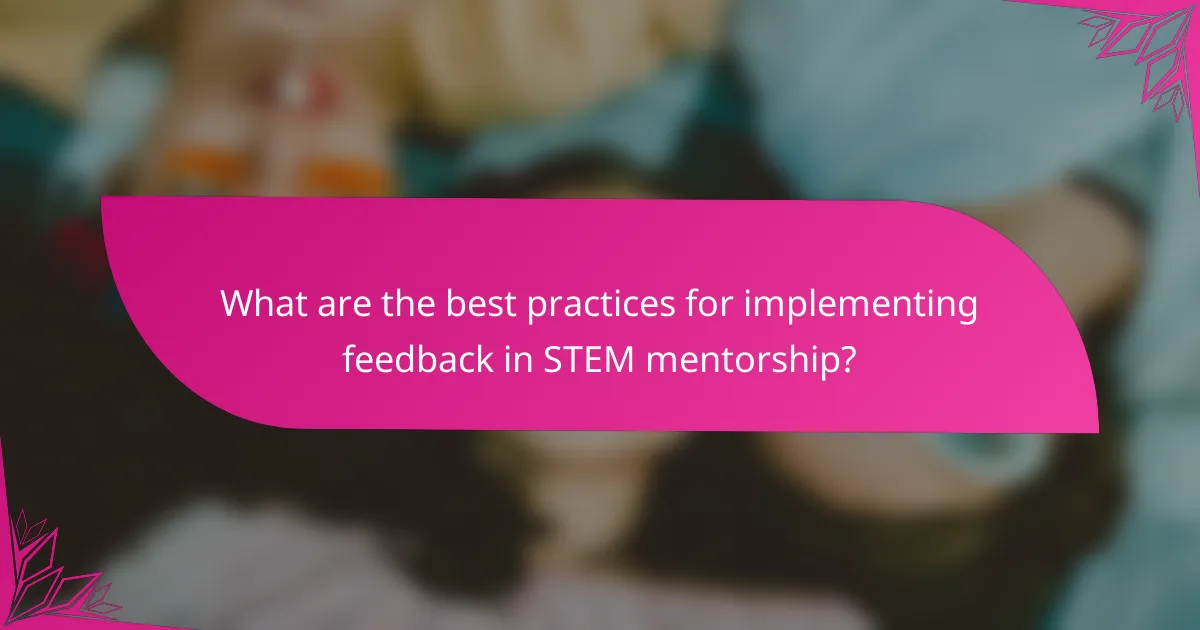
What are the best practices for implementing feedback in STEM mentorship?
Effective feedback is crucial for enhancing STEM mentorship outcomes for women. Best practices include establishing regular feedback sessions, providing mentorship training programs, and adopting continuous improvement frameworks.
Regular feedback sessions
Regular feedback sessions create a structured environment for open communication between mentors and mentees. These sessions should occur at consistent intervals, such as bi-weekly or monthly, to ensure ongoing dialogue and timely adjustments to mentorship strategies.
During these sessions, mentors should encourage mentees to share their experiences and challenges. This reciprocal exchange fosters trust and allows for targeted support, ultimately enhancing the mentorship experience.
Mentorship training programs
Implementing mentorship training programs equips mentors with the skills necessary to provide effective feedback. These programs should cover communication techniques, cultural competency, and strategies for addressing the unique challenges faced by women in STEM.
Training can take various forms, including workshops, online courses, or peer-led discussions. By investing in mentor development, organizations can create a more supportive and effective mentorship environment.
Continuous improvement frameworks
Adopting continuous improvement frameworks helps organizations systematically evaluate and enhance their mentorship programs. This approach involves regularly assessing feedback from both mentors and mentees to identify strengths and areas for growth.
Frameworks like Plan-Do-Study-Act (PDSA) can guide this process, allowing for iterative changes based on real-time feedback. By fostering a culture of continuous improvement, organizations can adapt their mentorship strategies to better meet the needs of women in STEM.

What challenges exist in collecting and analyzing feedback?
Collecting and analyzing feedback in STEM mentorship programs for women faces several challenges that can hinder effective outcomes. Key issues include participant reluctance to provide honest feedback and concerns regarding data privacy, both of which can significantly impact the quality and reliability of the data collected.
Participant reluctance
Participant reluctance often stems from fear of negative repercussions or a belief that their feedback may not lead to meaningful change. Many women in STEM may hesitate to express their true opinions, especially if they feel their comments could jeopardize their relationships with mentors or peers.
To mitigate this reluctance, creating a safe and anonymous feedback environment is crucial. Utilizing anonymous surveys or third-party facilitators can help encourage more candid responses, leading to richer insights into the mentorship experience.
Data privacy concerns
Data privacy concerns are paramount when collecting feedback, as participants may worry about how their information will be used or shared. Ensuring compliance with regulations such as GDPR in Europe or similar frameworks in other regions is essential to foster trust among participants.
To address these concerns, organizations should clearly communicate their data handling practices, including how feedback will be anonymized and the measures taken to protect sensitive information. Implementing secure data storage solutions and limiting access to authorized personnel can further enhance participant confidence in the feedback process.
